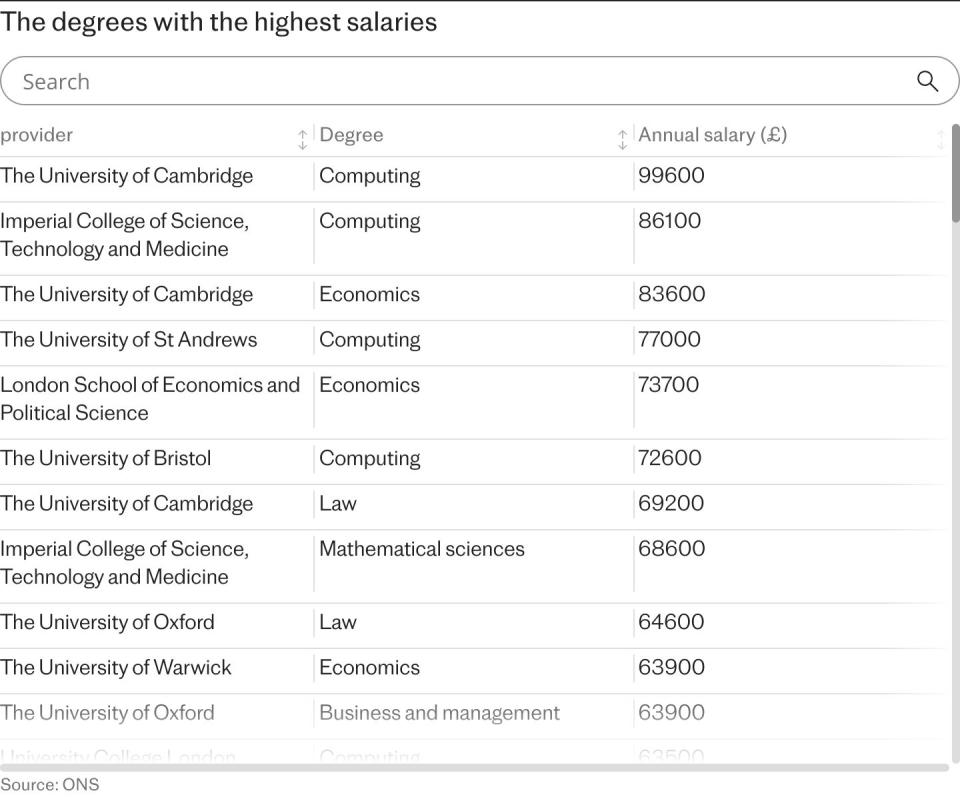The degrees where graduate pay is falling the fastest

At one point in time a university degree was the golden ticket to a high salary, but whether that is still the case is becoming increasingly unclear.
Department for Education figures show that graduates earn, on average, £38,500 five years after obtaining a degree – £11,500 more than those who did not attend university. But not all degrees are created equal, and new analysis shows that some once gold-plated degrees are losing their shine.
A graduate with a business and management degree from Oxford, for example, would have earned £66,600 in 2016, according to the Office for National Statistics, making it the most lucrative degree of its time. But in 2022, the most recent year for which figures are available, that same graduate could expect to earn £63,900 five years after graduation.
Our analysis found several examples of degrees that have slipped down the rankings. In 2016, an economics degree from the University of St Andrews was the third most lucrative degree, with graduates earning an average of £61,100 five years after graduating. It has since fallen to 19th place, with a typical graduate expected to earn £58,400.
The degree that’s seen the biggest post-graduation pay fall is in engineering from University of the Highlands and Islands, dropping from £38,100 to £27,400, a 28.08pc reduction. This is closely followed by graduate earnings for The University of Dundee’s medical sciences degree which have fallen by 26.37pc, and the nursing and midwifery degree at The University of Portsmouth where graduate earnings are down 25.23pc.
Though graduates still generally benefit from a salary premium, there is some evidence employers are turning away from degrees as an indicator of talent. The Institute of Student Employers found the share of members requiring a 2:1 degree had fallen from three quarters in 2014 to less than half in 2022. On LinkedIn, job postings not requiring a degree soared by 90pc between 2021 and 2022.
However, students can still leverage their degrees to higher salaries – if they study at the right place.
Looking at degrees that lead to the highest salaries, the top 10 was dominated by courses in computing, economics and law, especially when studied at high-ranking Russell Group universities such as Oxford and Cambridge, Durham, Warwick, as well as some of the University of London institutions.

Some degrees now lead to better salaries than they did five years ago. Of these, graduates who studied computing courses saw the biggest increase in average pay between 2016 and 2022 – up £10,000 from £29,700 to £39,700.
Cambridge’s computing course emerged as the most lucrative individual degree in 2022, with graduates earning an average of £99,600 five years after leaving university. It was followed by Imperial College’s equivalent course, which led to an average salary of £86,100 five years after graduation.
More broadly, medicine and dentistry graduates have remained the most consistently well-paid, earning £52,217 five years after finishing their studies. However, in percentage increase terms these salaries have actually increased the least of all degrees, rising by just 10.6pc relative to a 19.4pc average between 2015 and 2022.
Economics graduates are the next-best paid (average salaries of £43,902), followed by engineering (£37,921) and pharmacology (£37,578).
This comes after the Conservatives announced plans for a crackdown on so-called “Mickey Mickey degrees”, named for their perceived worthlessness and the low pay to which they typically lead.
In May, the Tories vowed to close down such degrees, believed to be studied by one in eight students in Britain.
“We will outlaw rip-off degrees so that no more students are lured on to courses that don’t deliver the outcomes people deserve,” Gillian Keegan, the Education Secretary wrote in the Telegraph. “Many graduates would be better served doing an apprenticeship. Rather than being saddled with debt, apprentices gain real-world experience and earn while they learn.”
Liz Emerson, of the Intergenerational Foundation think tank, warned against using expected salaries to measure the value of a degree. She said: “Higher education should be a public good whatever the level of graduate premium that comes from it. We profoundly disagree with the idea of discouraging any young person from going into higher education.
“But the graduate premium alone should not be used to put any young person off seeking a higher education qualification. It says more about the state of our society that a librarian is valued less than a banker.”
Nevertheless, going to university remains a momentous financial decision, one which could leave young people saddled with debt for their entire working lives. Under the plan five student loans that kicked in last autumn, graduates will start repaying once they earn £25,000, meaning many will be repaying more and for longer.
Due to the soaring cost of living and tuition fees running to £9,250 a year, the average balance outstanding in England is now £45,000.

 Yahoo Finance
Yahoo Finance 